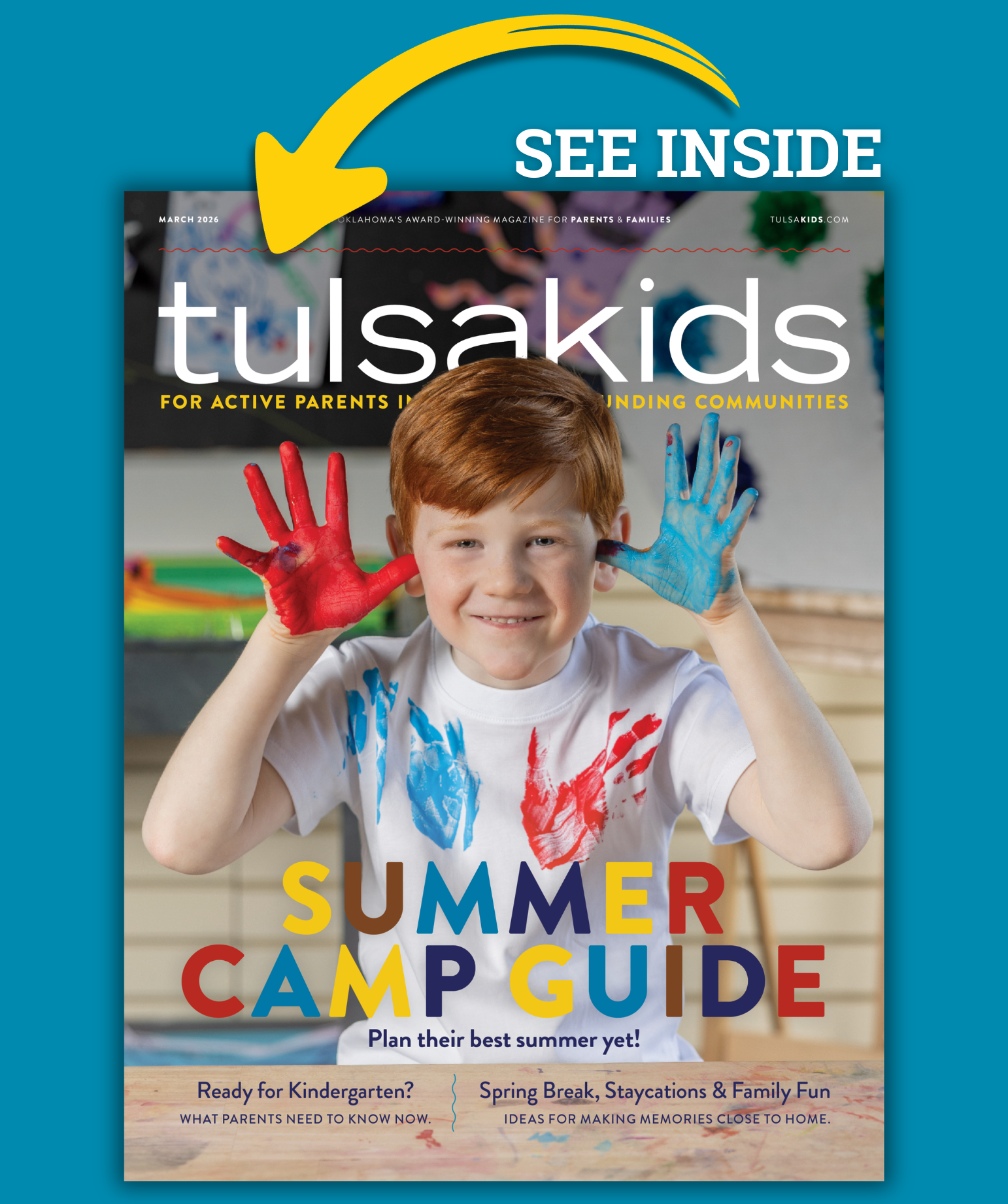The Light and Rainbows of Transition Academy
“Our hope for her, from the beginning, has been what it is for our other kids, that she will be a contributing member in society and that she will end up in a place that makes her happy and where she’ll thrive,” says Alana Kennon of her eldest child and only daughter, Lucy.
Lucy, who graduated from Memorial High School in 2024, is currently enrolled in Tulsa Transition Academy (TTA). Located in the former Grimes Elementary School, 3113 E. 56th, TTA is a Tulsa Public Schools program that provides a bridge from high school to adulthood for young adults with intellectual and developmental disabilities. For Lucy, who has trisomy 21, or Down syndrome, TTA provides an opportunity to socialize with peers, while gaining daily life and employment skills that will help her live more independently.
“She calls it college,” Kennon says. “For these students, this is their college, and it’s their opportunity to learn what they want to do.”

Young people like Lucy Kennon are learning valuable social, life and job skills at Tulsa Public Schools Transition Academy. Photo credit: Jenny White Photography
According to Jennifer Diggs, TPS’ Transition Program Coordinator, TTA is a consequence of House Bill 1041, which passed in 2023. In effect, the bill resulted in the creation of an alternate high school diploma for students with significant cognitive disabilities and the requirement that Oklahoma school districts continue to provide educational services for those students through the age of 22. The program is free and available to students who live in the district and meet the alternate diploma requirements.
A holistic approach
Diggs describes the program as “holistic” and individualized to meet the needs of each student.
“The overarching goal of the program is to support our students with developing independence at whatever level they’re capable of achieving,” she says. “That independence is in the four areas of transition, which are employment, independent living, community participation and post-secondary education, so that’s lifelong learning.”
For Lucy this translates to mastering basic tasks of daily life like dishwashing, cooking and cleaning and acquiring skills that will help her land a job, like alphabetizing, proper greetings and handshakes.
“It’s wonderful for her because it also gives her that socialization piece as part of the curriculum,” Kennon says. “They’re sitting down at breakfast and learning how to have conversations, learning how to have that back and forth, to say good morning and shake hands. It’s a continuation for her of being around her friends. Those are her people.”
Diggs says TTA has an occupational therapist assistant on staff to help the students learn life skills, which they practice in a mock apartment and kitchen. A speech pathologist is also available three days a week to help students overcome language barriers and learn alternate modes of communication. One of the best ways the students learn, however, is from each other.
“We also encourage our students to work together to learn new skills,” Diggs says. “They’re helping each other. They’re supporting each other. They’re problem solving and seeing growth.”
Creating opportunities
To help students find their purpose and place in the community, TTA partners with area nonprofits and other organizations to create real-world experiences and opportunities.
“Our students are some of the most wonderful potential employees I’ve ever seen,” Diggs says. “They show up. They’re ready to go. They love to work. They love to interact with people. They want to do a good job. I mean, you couldn’t ask for a better potential employee or volunteer at your site.”
Ultimately, Kennon would like to see Lucy find a part-time job that uses her skills and fits her passions. She says Lucy loves to serve and gravitates towards children.
“Our hope is that maybe she could be an aide in a classroom, or an afternoon worker at a daycare, even if it’s just the one delivering the food,” Kennon says.
She also hopes the broader community will gain a better understanding of and appreciation for this population.
“What a lot of people don’t understand is how, yes, cognitively, they are delayed, but they have so much they can offer if the community will open its arms,” she says.
Diggs, who’s been with the program since its inception, agrees.
“As a special education teacher, which I am at heart and will always be, having the opportunity to do this program has been beyond rewarding for me. It’s the dream. It’s being able to do all of the things that these students need, give them all of the opportunities,” she says. “I just want people to know how wonderful this population of people are. IDD (Intellectual or Developmental Disability) citizens are just the best. They’re so much fun. We always say at Transition Academy that this is the light and rainbows location. We just have so much fun, and it’s so wonderful.”
For more on TTA, including information about the extended school year program available for all ages of students, visit tulsaschools.org.
 Julie Wenger Watson is a freelance writer who’s worked in all aspects of music promotion. She’s also Co-Director of “Live From Cain’s,” a public radio show pilot.
Julie Wenger Watson is a freelance writer who’s worked in all aspects of music promotion. She’s also Co-Director of “Live From Cain’s,” a public radio show pilot.




